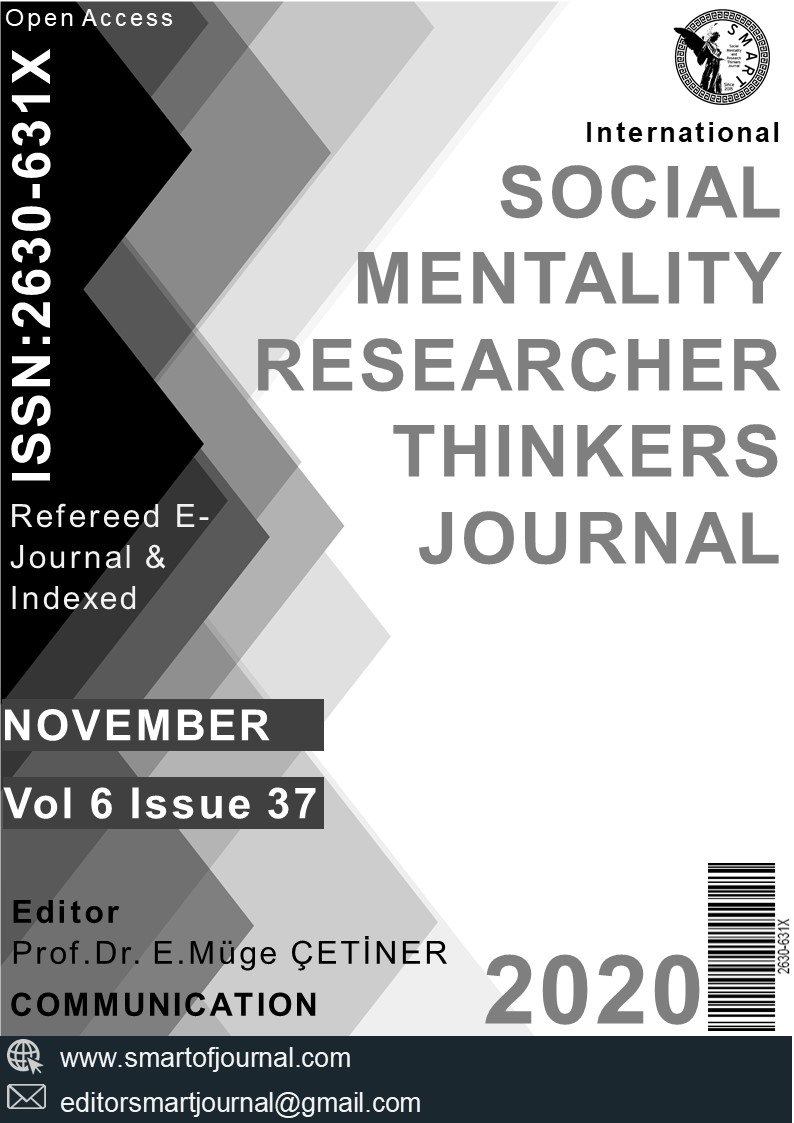ESPORA KATILIM MOTİVASYONUN İNCELENMESİ: FARKLI TÜRDE ESPOR OYUNLARI OYNAYAN ESPORCULAR ÜZERİNE BİR ARAŞTIRMA
Author :
Abstract
Geleceğin sporu olarak bilinen espora katılımda etkili olan motivleri belirlemek ve bu motivlerin farklı espor oyun türlerinde değişiklik gösterip göstermediğini belirlemek bu çalışmanın amacını oluşturmaktadır. Çalışmaya 338 erkek, 128 kadın olmak üzere, amatör olarak espor oyunları oynayan 466 gönüllü oyuncu katılmıştır. Veri toplama aracı olarak E-Spor Katılım Motivasyonu Ölçeği (Öz ve Üstün, 2019) kullanılmıştır. Veriler çevrimiçi anket yolu ile toplanmış olup, elde edilen verilerin analizi için SPSS 25.0 programı kullanılmıştır. Araştırma sonuçlarına göre; farklı türde espor oyunları oynayan oyuncuların espor katılım motivasyonlarının farklılık göstermediği belirlenmiştir. Buna ek olarak oyuncuların espora katılım motivasyonları alt boyutlarından en yüksek ortalamaya boş zamanı değerlendirme alt boyutunun sahip olduğu belirlenmiştir. Espor aktivitelerine amatör olarak katılabilmek için geleneksel sporlarda olduğu gibi kesin bir zaman diliminin olmaması, oyuncuların istedikleri zaman bu aktivitelere katılmasına imkan tanımaktadır. Oyunların; kişilerin normal rutin yaşantılarından uzaklaşıp farklı aktiviteler yaparak, gerçek hayattaki sorun ve sıkıntılarından uzaklaşmasına yardımcı olduğu, bu yüzden boş zamanlarında espor aktivitelerine yöneldikleri düşünülmektedir. Ölçek alt boyutlarından en düşük ortalama sahip altboyut ise rekabet ve başarı olurken, bu alt boyutta yer alan espordaki ödülleri kazanmayı seviyorum maddesinin ortalama puanının yüksek olması, ciddi miktarlara ulaşan espor gelirlerinden kaynaklandığı söylenebilir.
Keywords
Abstract
The aim of this study is to determine the motivations that are effective in participating in esports, which is known as the sport of the future, and whether these motivations differ in different types of esports games. 466 volunteer players, 338 men and 128 women, who play esports games as an amateur, participated in the study. Esports Participation Motivation Scale (Öz & Üstün, 2019) was used as data collection tool. The data were collected through an online questionnaire and the SPSS 25.0 program was used to analyze the data obtained. According to the research results; It has been determined that the esports participation motivations of the players who play different types of esports games do not differ. In addition, it was determined that the leisure time evaluation sub-dimension has the highest average among the players' motivation to participate in esports. In order to participate in esports activities as an amateur, the lack of a definite time period as in traditional sports allows players to participate in these activities whenever they want. Your games; It is thought that it helps people get away from their real life problems and troubles by moving away from their normal routine lives and doing different activities, so they tend to esports activities in their spare time. While the sub-dimension with the lowest average among the sub-dimensions of the scale is competition and success, it can be said that the high average score of the item I love to win the awards in esports in this sub-dimension is due to the esports revenues reaching significant amounts.
Keywords
- Adams, K., Devia-Allen, G. and Moore, M. (2019), “What is Esports?”, in Rogers, R. (Ed.),
- Adams, K., Devia-Allen, G. and Moore, M. (2019), “What is Esports?”, in Rogers, R. (Ed.),Understanding Esports – an Introduction to a Global Phenomenon, Lexington Books, Maryland, pp. 3-15.
- Altibox (2019), “Alt klart til e-kamp [Everything set for the eSeries]”, https://www.altibox. no/2019/04/09/alt-klart-til-e-kamp/ (Erişim: 29 Eylül 2020).
- Bal, M. S., & Karademir, N. (2013). Sosyal bilgiler öğretmenlerinin teknolojik pedagojik alanbilgisi (tpab) konusunda öz-değerlendirme seviyelerinin belirlenmesi. Pamukkale Üniversitesi Eğitim Fakültesi Dergisi, 34(2), 15-32.
- Conroy, E., Kowal, M., Toth A.J., Campbell M.J. (2020) Boosting: Rank and skill deception inesports, Entertainment Computing. doi: https://doi.org/10.1016/j.entcom.2020.100393.
- Cronbach, L. J. (1951), “Coefficient Alpha and the Internal Structure of Tests”, Psychometrika, 16(3), pp 297-334.
- Demir, A. & Sertbaş, K. (2020). E-Spor: Spor Endüstrisinde Yeni Bir Ekonomi. USBAD Uluslararası Sosyal Bilimler Akademi Dergisi 2(3), 73-88.
- Esportearnings. (2020). Erişim adresi: https://www.esportsearnings.com/history.
- Funk, D. C., Pizzo, A. D., & Baker, B. J. (2018). eSport management: Embracing eSport education and research opportunities. Sport Management Review, 21(1), 7-13.
- IOC (2018), “Olympic movement, Esports and gaming communities meet at the Esports forum”,available at: https://www.olympic.org/news/olympic-movement-esports-and-gaming- communities- meet-at-the-esports-forum (Erişim: 29 Eylül 2020).
- Jenny, S. E., Manning, R. D., Keiper, M. C., & Olrich, T. W. (2017). Virtual (ly) athletes: where eSports fit within the definition of “Sport”. Quest, 69(1), 1-18.
- Jonasson, K. and Thiborg, J. (2010), “Electronic sport and its impact on future sport”, Sport in Society, Vol. 13 No. 2, pp. 287-99, doi: 10.1080/17430430903522996.
- Kalaycı, Ş. (2016). SPSS uygulamalı çok değişkenli istatistik teknikleri (Vol. 9). Ankara: Dinamik Akademi Yayın Dağıtım.
- Karasar, N. (2012). Bilimsel araştırma yöntemi. (24. Basım). Ankara: Nobel Yayın Dağıtım.Kennedy, J., & Rozelle, W. (2016). League of Legends world championship by the numbers. Kilci A.K. (2019). Spor ve Dijital Oyunda Son Nokta: ESPOR. Ankara: Gazi Kitabevi.
- Koueider A. (2018). Interview with OpTic's LoL General Manager Romain. https://www.liquidlegends.net/forum/lol-general/531576-interview-with-optics-lol-general-
- manager-romain, 2018 (Erişim Tarihi: 24 Ekim 2020).
- Li, R. (2016). Good luck have fun: The rise of esports. New York: Skyhorse Publishing.Loy,
- Mirabito, T. and Kucek, J. (2019), “Sports video games (SVGs) in the Esports landscape”, inRogers, R. (Ed.), Understanding Esports – an Introduction to a Global Phenomenon, Lexington Books, Maryland, pp. 135-153.
- Morgan, L. (2019), “Liam Morgan: esports is coming to the Olympics after all as Paris 2024 revealideas to improve fan engagement”, available at: https://www.insidethegames.biz/articles/1075990/liam-morgan-esports-is-coming-to-the-olympics-after-all-as-paris-2024-reveal-ideas-to- improve-fan-engagement (Erişim: 29 Eylül 2020).
- Öz, N.D., ve Üstün, F. (2019) E-Spor katılım motivasyonu ölçeği‟nin (EKMÖ) geçerlik ve güvenirlik çalışması. Türk Spor Bilimleri Dergisi, 2(2), 115-125.
- Özdamar, K. (2013). Paket Programlar ile İstatistiksel Veri Analizi (Package Programs and Statistical Data Analysis). Eskişehir: Nisan Kitabevi.
- Tabachnick, B. G., Fidell, L. S., & Ullman, J. B. (2007). Using multivariate statistics (Vol. 5). Boston, MA: Pearson.
- Tassi P. (2014). The U.S Now Recognizes eSports Players As Professional Athletes; 2014.Available: https:// www.forbes.com/sites/insertcoin/2013/07/14/the-u-s-now-recognizes-esports- players-as-professional- athletes/#1c9aa0e73ac9. Erişim Tarihi: 23 Eylül 2020.
- Tjønndal, A. (2020). “What's next? Calling beer-drinking a sport?!”: virtual resistance to considering eSport as sport. Sport, Business and Management: An International Journal.
- Yang, Y. (2018). Research on esports and esports industry in china. China sports science.
